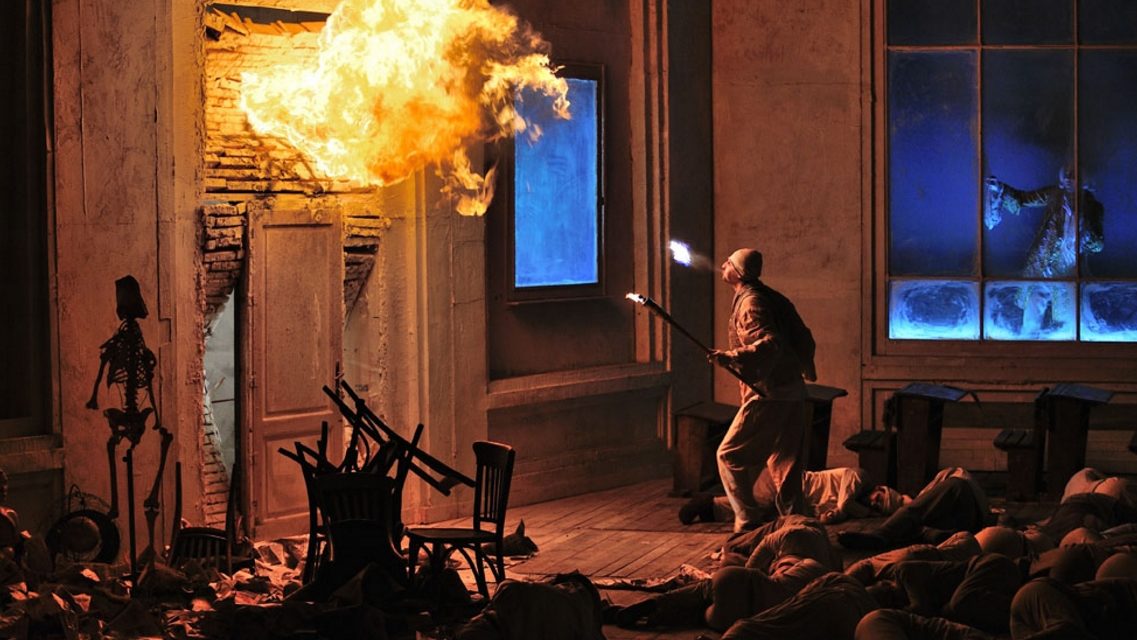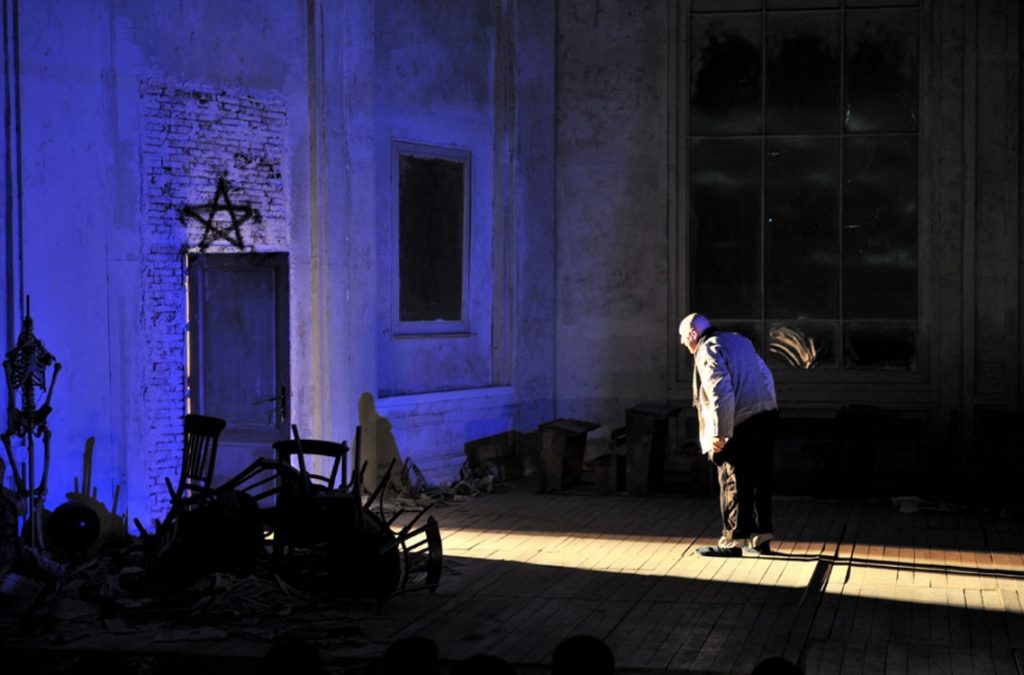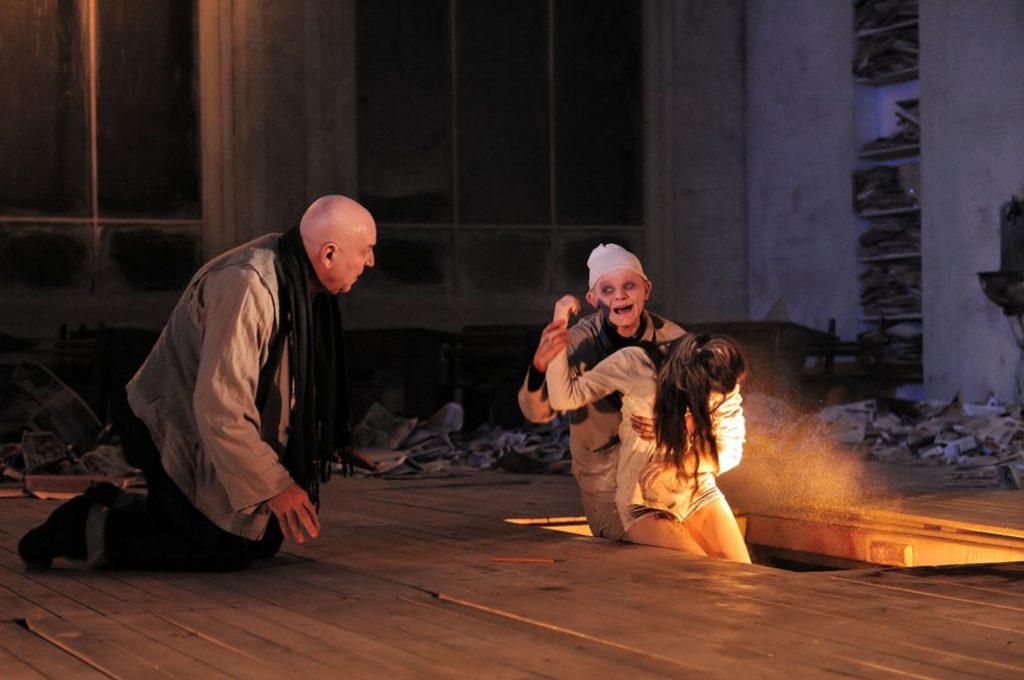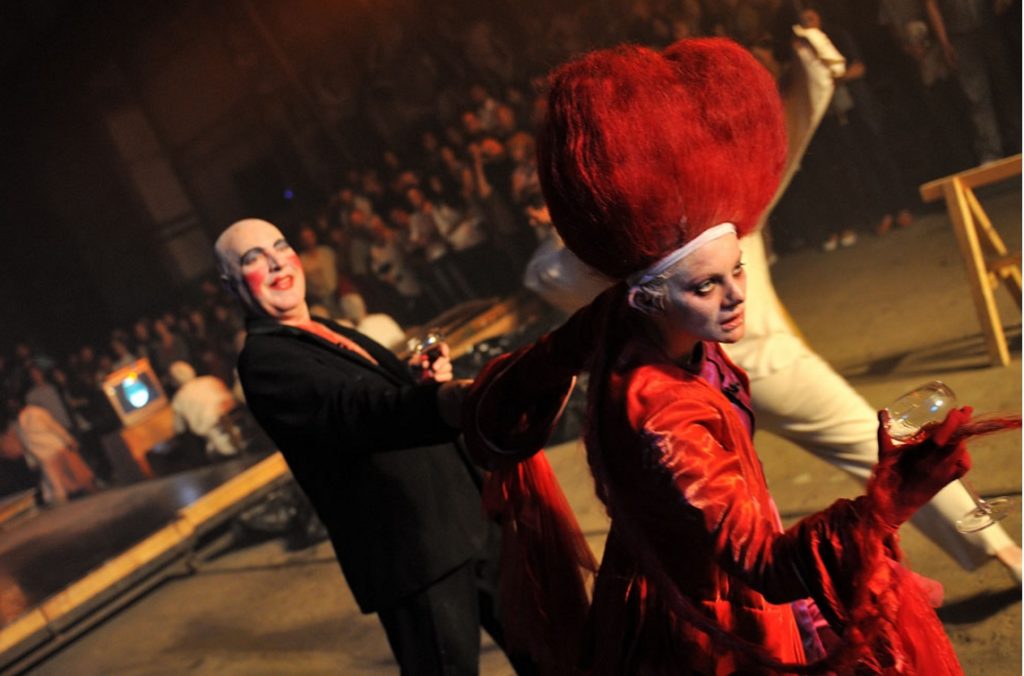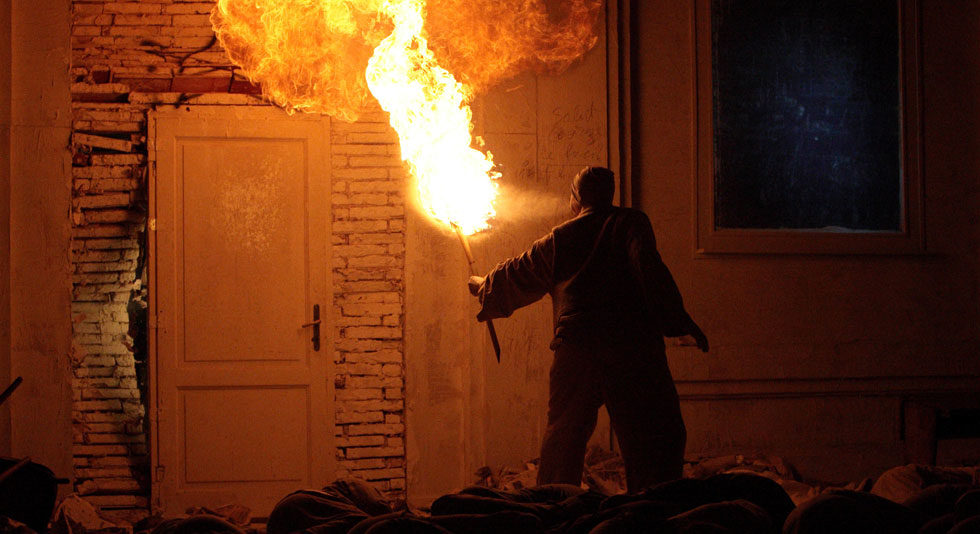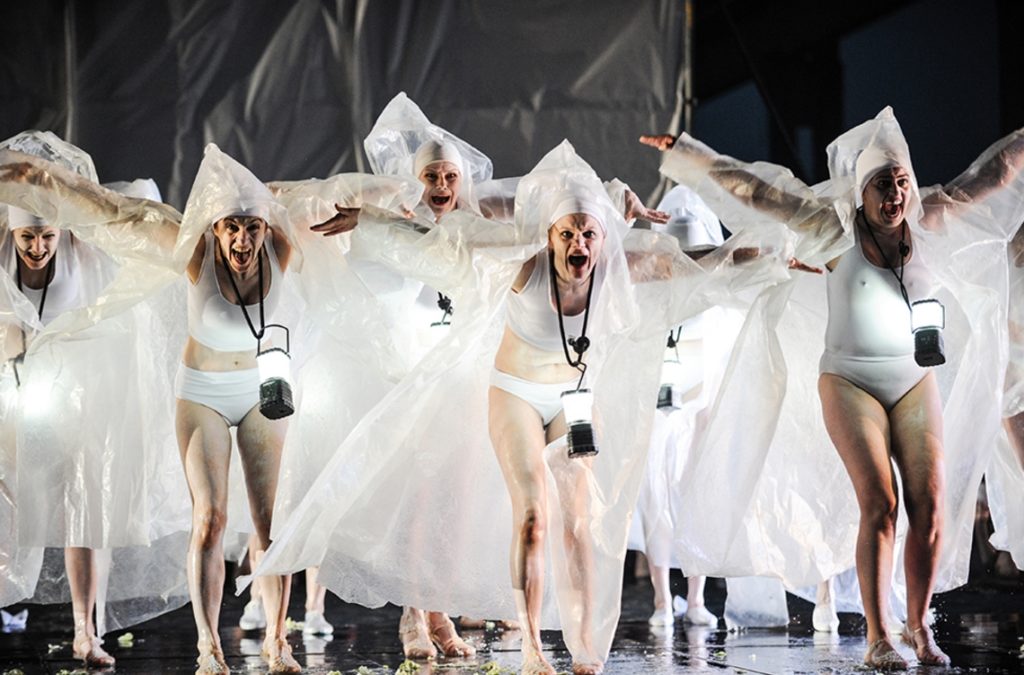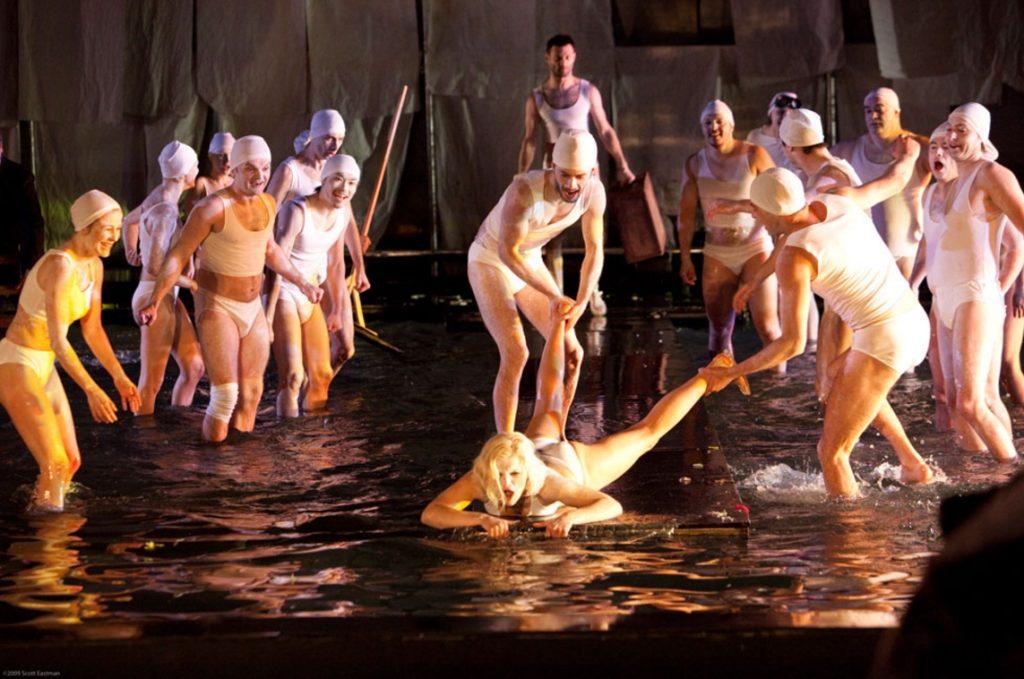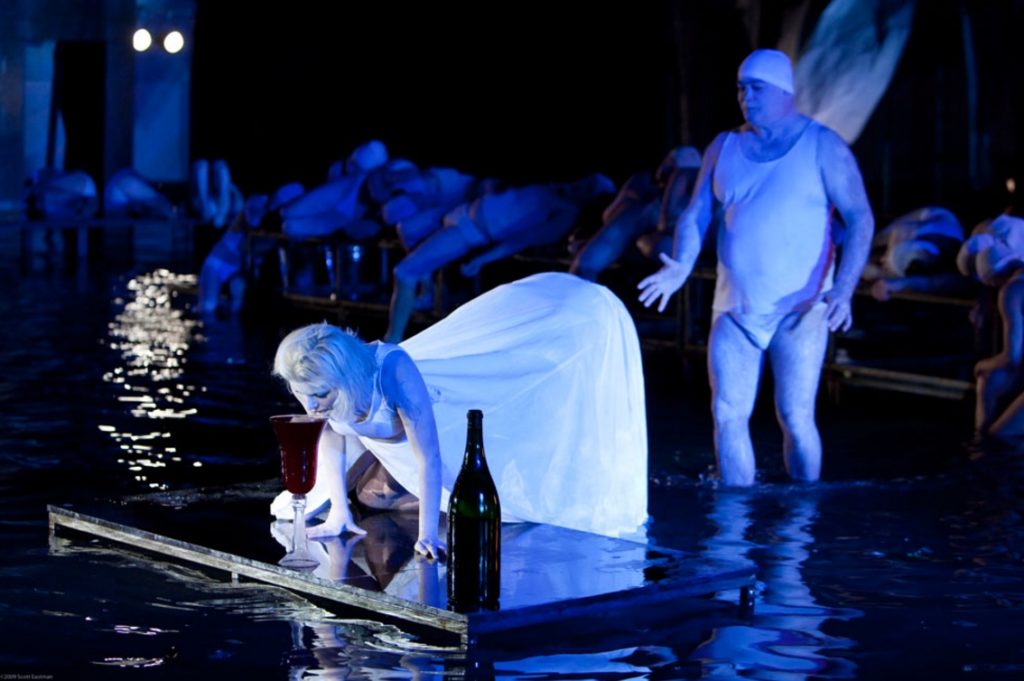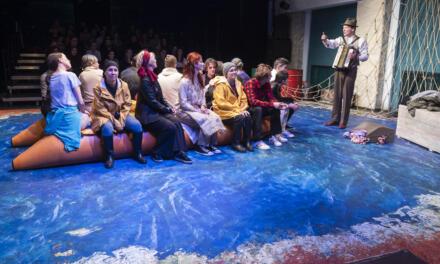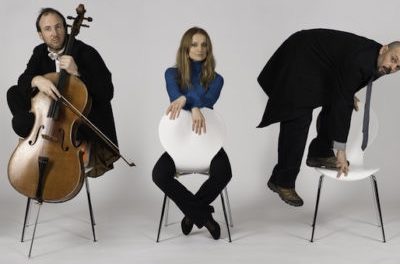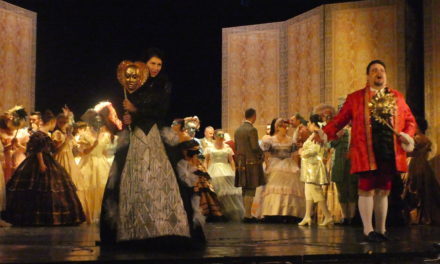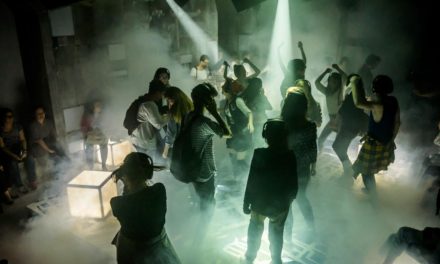Theatre professionals have recognised his achievements in superlative terms: “A magnificent production” (Bernard Faivre D’Arcier, former Director of the Avignon Festival); “Purcărete’s show has been one of the greatest hits of the festival, an original and powerful production” (Frank Dunlop, former Director of the Edinburgh International Festival); “Masterpieces . . . brilliant, powerful and free” (Marie-Hélène Falcon, Director of the Festival TransAmériques. Silviu Purcărete’s theatrical achievement is a synthesis of archaeology and anticipation; it is a theatre of the Art of Direction, in which classic works are rediscovered by means of contemporary forms of expression and invention. His productions are impressive. They are forms of jubilation, they offer “excessive images” and most of the time they use non‑conventional spaces.
In his early career, he directed an outdoor performance of Atrides’ Legends in the scenic surroundings of an ancient city, with 8‑metre-high masks, and Hecuba on a beach on the Black Sea coast. He then went on to work abroad. Performances designed and realised for conventional spaces were transposed to non‑conventional spaces. Natural elements like stone, water, the starry sky, the sun and the moon enriched the ideation and artistic expressivity of these theatre settings. At the Milan Festival, under the open sky, Ubu Rex with Scenes from Macbeth was staged in a Greek and Roman theatre built in a nineteenth‑century villa. At the Gibellina Festival, in Sicily, Fedra was performed in a village in the mountains untouched since a devastating earthquake in 1968. The successful Les Danaïdes production by the Craiova National Theatre (co‑producers: Holland Festival, Wiener Festwochen, Festival d’Avignon, Grande Halle de la Villette), often compared to The Mahabharata, by Peter Brook, was performed at the fiftieth anniversary edition of the Avignon Festival in a miraculous setting—La Carrière Redland à Boulbon.
Faust, staged in a disused factory by the Sibiu National Theatre, became, at the invitation of Jonathan Mills, a triumph of the 2009 Edinburgh Festival, where it was enacted at Ingliston Lowland Hall, near the airport. Metamorphoses, by Ovid, a show produced by the same theatre company as part of the European Capitals of Culture Programme for 2007 (Sibiu and Luxembourg), was held in a pool full of water lined with multimedia stages and screens. By escaping to non‑conventional spaces, Silviu Purcărete makes the cardboard swords of the theatre cut through flesh. There is an overwhelming combination of panic, despair and evil that devours the world, and a sense of anxiety and crisis in a world in which God is dead, everything is meaningless and Man futile.
A World Demonised by Play and Eros
The elements selected by Purcărete from Goethe’s dramatic work include the Faustian bargain, the relationship between Faust and Margaret, Walpurgis Night and Faust’s ascension to Heaven. The script is essentially a libretto for text, music and mime. The chant “Christ has risen” accompanies the audience as they enter the performance space. The curtain is raised to reveal Faust’s “study”—a cold, austere chamber containing heaps of paper, newspapers and books, a dirty sink and benches occupied by Faust’s students: homunculi working at laptops resembling the residents of a lunatic asylum. Faust, fearing death and old age, finds himself overwhelmed by a monstrous kind of vitality and a vampire‑like desire to live. He, therefore, enters into a pact with Mephistopheles, a bizarre, androgynous, caricatured being—part transsexual, part living dummy. The windows fly wide open, Faust’s chamber falls apart and we advance into Walpurgis Night together with the actors. Sex, the matrix of life, without love will give rise to devastating passions akin to bestiality, sodomy and pedophilia. The stage is invaded by a sadomasochistic world, a world driven by basic instincts and repressed obsessions and which shamelessly exhibits its exasperated sexuality. We witness an apocalyptic vision of life and death: shocking images of Margaret, played by seven girls, the heroine’s rape at the hands of the devil, the disfigurement, and murder of the child born of Faust’s relationship with Margaret.
The stage director constructs a playful dream, an atemporal and, at the same time, contemporary show that alludes to our daily dreams and nightmares. Elements of multimedia—a rock group performing live, streams of fire and fireworks—are but some of the ingredients of this production that make you feel the power of the theatre.
Faust and Mephistopheles demonise the world through play. They do it with aesthetic pleasure. Theirs is an absolute freedom, for they love no one. In the end, Mephistopheles’ solitude is cosmic. The other world is not an island that saves you from nothingness. Faust’s death and ascension to Heaven are merely staged. The roles have been reversed: Faust winks at Mephistopheles grotesquely, shouting “I’ve got the better of you!”—for he has taken on Mephistopheles’ role of “God’s fool.”
Homo Animalis vs. Homo Spiritualis
In Metamorphoses after Ovid, the director follows Satan’s Law, according to which there is no other world, no other reality; there is Nobody and there is forgiveness.
“If I do theatre, it is to force the audience to confront the monstrosity of our lives and help them to exorcise it,” explains Purcărete. And because he likes texts worn old by time, he chose for inspiration the 250 myths written 2,000 years ago in verse. Interpreted in a post‑modern manner, the poet comes across as a very contemporary author. The myths of humanity are illustrated by characters on which erotic and gastronomic fantasy exercise a tyrannical hold.
Man, “created in God’s image, ruler over all,” struggles with the beast in himself. “The syndrome of the wild beast” associated with the sexual act and that of eating is the leitmotif of this production. We witness the “zoomorphism” of the human being and the “anthropomorphism” of animals.
Staged in Sibiu, the performance takes place in the city, in a car park, in a spectacular theatrical setting: a pool full of water, bordered on one side by the stage with scaffolding on the other, and with a screen in the background where the players practice metamorphosing into animals. Resembling dancers in their soft white, tightly fitting costumes, the players perform in water, on practicables, on the screen. They give life to “temperaments” harmful to man’s conscience. They strain under the burden of sin against nature and God.
There are unforgettable scenes like the Flight of Icarus, Centaurus, the Plague of Aegina. The ceremonies of cruelty—constructed using their bodies and voices—sends a chill down the spine. In the end, escaping the confines of humanity is not to be achieved by reaching for the skies. Icarus falls down, the world is taken over by plague, the fight does not destroy the monsters, it does not dispel the darkness. Salvation and light are brought by fire. The infernal space is burned, and the actors speak to the public, confronting the indifference of a world stigmatized by the cross of non‑love. “Evil,” explains Silviu Purcărete, “will never disappear, it can only be counterbalanced by civilization. Wherever you are, if you despise demons, they will return.”
Faust and Metamorphosis form a satanic diptych that speaks about the apocalypse of us.
This post was written by the author in their personal capacity.The opinions expressed in this article are the author’s own and do not reflect the view of The Theatre Times, their staff or collaborators.
This post was written by Ludmila Patlanjoglu.
The views expressed here belong to the author and do not necessarily reflect our views and opinions.

